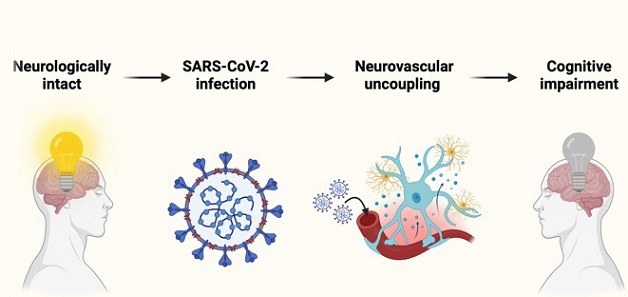COVID-19 Cognitive Deficits Likely Caused By Impairment Of Neurovascular Coupling
Nikhil Prasad Fact checked by:Thailand Medical News Team Mar 09, 2024 1 year, 11 months, 2 weeks, 5 days, 3 hours, 22 minutes ago
COVID-19 News: The COVID-19 pandemic, caused by the novel coronavirus SARS-CoV-2, has not only posed a threat to respiratory health but has also brought to light a myriad of complications affecting various organ systems, including the brain. Cognitive impairment has emerged as a significant concern, affecting a considerable portion of COVID-19 patients, particularly those with underlying health conditions. This
COVID-19 News report explores the intricate relationship between COVID-19 and cognitive deficits, delving into the neurovascular unit (NVU) and its coupling mechanism as potential key players in the pathophysiology of COVID-19-induced cognitive impairment based on a study by researchers from University of Oklahoma Health Sciences Center-USA.
 Graphical Abstract: COVID-19 Cognitive Deficits Likely Caused By Impairment Of Neurovascular Coupling
The Neurovascular Unit and Cognitive Processing
Graphical Abstract: COVID-19 Cognitive Deficits Likely Caused By Impairment Of Neurovascular Coupling
The Neurovascular Unit and Cognitive Processing
The brain's ability to function optimally relies on a delicate balance within the neurovascular unit (NVU), a complex network of brain parenchymal cells (neurons, glia) and cerebrovascular cells (endothelia, smooth muscle cells, pericytes). The NVU ensures precise adjustment of cerebromicrovascular blood flow, a process known as neurovascular coupling (NVC), to meet the energetic demands of active neurons. Disruptions in the NVU have been implicated in cognitive dysfunction associated with various conditions, including aging, diabetes, and cerebral small vessel disease.
COVID-19's Impact on Cognitive Function
While the acute symptoms of COVID-19 often manifest as respiratory issues, the virus's impact extends to other organ systems, with the brain being a vulnerable target. Evidence suggests that cognitive impairment is prevalent in both acute and convalescent stages of COVID-19, with up to 70% of patients experiencing persistent cognitive deficits after recovery. This cognitive decline is particularly pronounced in older adults with underlying health conditions, necessitating a comprehensive exploration of the mechanisms behind COVID-19-induced cognitive impairment.
Cell-Specific Interactions in Neurovascular Coupling
Neurovascular coupling, a fundamental mechanism for normal cognitive processing, involves intricate interactions between neurons and vascular cells. The endothelium, a crucial component of the NVU, plays a central role in mediating the vasodilatory response essential for NVC. COVID-19's impact on the cerebrovascular endothelium, marked by specific interactions with the angiotensin converting enzyme 2 (ACE2) receptor, has been implicated in endothelial dysfunction and subsequent disruption of NVC.
Cognitive Impairment in COVID-19: A Comprehensive Overview
The prevalence of cognitive impairment following COVID-19 infection is a pressing concern, affecting nearly one in four patients up to one year post-infection. This impairment spans multiple cognitive domains, including executive function, attention, working memory, visuospatial and episodic memory. Imp
ortantly, the severity of acute infection does not solely dictate the onset of cognitive impairment, emphasizing the independent role of COVID-19 as a contributor to cognitive decline.
Mechanism of Infection and Neurological Consequences
The mechanism of SARS-CoV-2 infection within the cerebrovascular endothelium, leading to subsequent endothelial activation and blood-brain barrier disruption, has been extensively studied. The virus's impact on the renin-angiotensin pathway, specifically through the ACE2 receptor, contributes to neuroinflammation and thromboinflammatory states, further complicating the neurological consequences of COVID-19.
Neurovascular Uncoupling in COVID-19
Neurovascular uncoupling, a common feature in cognitive decline and dementia, emerges as a potential mechanism for COVID-19-induced cognitive impairment. Elevated levels of reactive oxygen species (ROS) in COVID-19 patients contribute to endothelial dysfunction, impairing NVC responses. Clinical evidence, such as decreased retinal microvascular reactivity, supports the hypothesis of impaired NVC in convalescent COVID-19 patients, highlighting the need for further mechanistic studies.
Prevention and Therapeutics
Recognizing COVID-19 as a vascular risk factor for cognitive impairment opens avenues for preventive and therapeutic interventions. Early evidence suggests the potential benefit of treatments targeting endothelial health, such as angiotensin receptor blockers (ARBs), in mitigating NVC impairment. Additionally, lifestyle changes, including physical exercise, may play a role in alleviating cognitive deficits associated with long-term COVID-19 symptoms.
Conclusion
As the world grapples with the long-term consequences of the COVID-19 pandemic, understanding its impact on cognitive function becomes paramount. The intricate interplay between SARS-CoV-2 and the NVU, particularly the disruption of neurovascular coupling, sheds light on potential mechanisms contributing to cognitive impairment. Future research and clinical efforts must converge to unravel this neurovascular puzzle, providing insights into therapeutic interventions that can mitigate the cognitive deficits induced by COVID-19. The urgency of such investigations is underscored by the profound implications of cognitive impairment on both individual well-being and public health.
The study findings were published in the peer reviewed journal: Brain Communications (Oxford Journals).
https://academic.oup.com/braincomms/advance-article/doi/10.1093/braincomms/fcae080/7623634
For the latest
COVID-19 News, keep on logging to Thailand Medical News.
